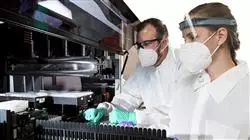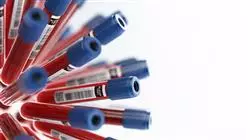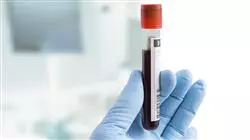University certificate
The world's largest faculty of medicine”
Description
This program will allow you to integrate the latest advances in hematology into your daily work, delving into issues such as von Willebrand disease or Waldenström's macroglobulinemia"

In recent years, hematology has undergone major transformations that have led to the incorporation of numerous new procedures, diagnostic techniques and scientific discoveries. As such, the discipline has recently undergone remarkable changes, driven by the continuous advances made by researchers and specialists. For this reason, physicians whose careers are related to this field need to get up to speed immediately, a goal that they will be able to achieve thanks to this program.
This advanced master’s degree in Clinical Hematology has brought together all the innovations in this area, integrating in a single degree not only aspects such as the latest developments in the physiology of hemostasis, but also other fields such as transfusion medicine. Accordingly, this program is the most complete and up-to-date on the market, and will delve into other relevant issues such as plasma cell dyscrasias, oncohematological diseases such as leukemias and lymphomas or the latest advances in transfusion in pediatric patients.
Thanks to this degree, the specialist will be able to update their knowledge through an online teaching system that will make it very easy to study, since it will not subject them to rigid schedules or uncomfortable commutes. Additionally, students will be supported by a highly prestigious teaching staff in the field of hematology, who will provide them with all the latest developments in the discipline using the best teaching resources, presented in various multimedia formats.
You will be able to learn the most recent developments in plasma cell dyscrasias through a 100% online teaching methodology"
This advanced master’s degree in Clinical Hematology contains the most complete and up-to-date scientific program on the market. The most important features include:
- Practical cases presented by experts in medicine
- The graphic, schematic, and eminently practical contents with which they are created, provide scientific and practical information on the disciplines that are essential for professional practice
- Practical exercises where self-assessment can be used to improve learning
- Special emphasis on innovative methodologies in Clinical Hematology
- Theoretical lessons, questions to the expert, debate forums on controversial topics, and individual reflection assignments
- Content that is accessible from any fixed or portable device with an Internet connection
No rigid schedules or uncomfortable commutes. Update your knowledge in hematology from your home or office, at your own pace, whenever and however you want"
Its teaching staff includes professionals from the field of hematology, who contribute to this program the experience of their work, as well as renowned specialists from leading societies and prestigious universities.
The multimedia content, developed with the latest educational technology, will provide the professional with situated and contextual learning, i.e., a simulated environment that will provide an immersive learning experience designed to train for real-life situations.
This program is designed around Problem-Based Learning, whereby the student must try to solve the different professional practice situations that arise during the academic year. For this purpose, the professional will be assisted by an innovative interactive video system created by renowned and experienced experts.
Throughout the program, you will receive guidance from a highly regarded faculty in the field of hematology"

You will have state-of-the-art multimedia resources at your disposal: case studies, procedural videos, master classes, interactive summaries"
Objectives
The main objective of this advanced master’s degree in Clinical Hematology is to provide specialists with the most advanced knowledge in this complex medical area. To achieve this goal, this program offers its students completely up-to-date content, including the latest scientific theories in all relevant areas of the discipline, a teaching staff of great international prestige, and a learning system that will be fully adapted to their personal and professional circumstances.

You will be able to update your knowledge immediately in areas such as spinal cord disorders or hemophilia diagnostic processes"
General objectives
- Provide the specialist with the latest scientific evidence on the use of diagnostic and therapeutic tools for hematologic diseases
- Develop comprehensive prevention, diagnosis, treatment and rehabilitation actions, with a multidisciplinary and integrative approach that facilitates medical care with the highest quality standards for the control and follow-up of hematological patients
- Know everything about the process of blood donation and blood components
- Understand hemovigilance as a transversal process involving the entire transfusion chain, from donor to patient
Specific objectives
Module 1. Recent Discoveries in Hematopoiesis, Cytogenetics, and Immunophenotyping in Hematology
- Get up to date in the aspects of Pathological Anatomy, Biochemistry, Immunology, Genetics, and Molecular Biology of hematologic diseases
Module 2. Update on the Importance of the Laboratory in Hematology and Hemotherapy
- Get up to date in molecular and cellular biology, providing general concepts of modern molecular terminology, essential for future medical practice, both at clinical and diagnostic laboratory levels
- Explain the latest advances introduced in clinical practice on hematopoietic progenitor cell transplantation
- Emphasize the role of the rational use of diagnostic technologies when studying these patients
Module 3. Update on Anemia
- Obtain the most advanced knowledge of anemias
Module 4. Scientific Developments in Spinal Cord Disorders
- Incorporate into professional practice the latest scientific developments in this type of disorders
Module 5. Current Events in Hemostasis Physiology
- Explain the complex pathophysiologic and etiopathogenic interrelationships in the mechanisms of hematologic disease onset
- Explain the pathophysiological and pathogenic interrelationships between each of these diseases in morbidity and mortality
Module 6. Update on Coagulation, Thrombosis, and Fibrinolysis Tests
- Take an in-depth look at epidemiological studies on morbimortality due to hematological disorders
Module 7. New Developments in Major Bleeding Disorders
- Take an in-depth look at the most innovative and developing alternatives offered when caring for these patients
- Emphasize future challenges for the development of new diagnostic and treatment strategies to reduce morbidity and mortality
Module 8. Update on Antihemorrhagics
- Address, in detail and depth, the most up-to-date scientific evidence on the mechanisms of action, adverse effects, dosage, and use of drugs to treat these diseases
- Emphasize the development of new drugs for the future and other treatment approaches for controlling these diseases
Module 9. Advances in Leukemia, Lymphoma and other Oncohematologic Diseases
- Get up-to-date on the epidemiology, etiopathogenesis, diagnosis, and treatment of the various hematological malignancies: myelodysplastic syndromes, acute myeloid and lymphoid leukemias, chronic myeloproliferative syndromes,
- Hodgkin and non-Hodgkin lymphomas, plasma cell dyscrasia, etc.
Module 10. Update on Plasma Cell Dyscrasias
- Learn about the latest developments in plasma cell dyscrasias
Module 11. New Developments in the General Treatment of Hematologic Diseases
- Provide students with advanced, in-depth, up-to-date, and multidisciplinary information that allows them to comprehensively approach the hematological health/disease process, ensuring proper treatment and the use of all appropriate therapeutic procedures
- Get up to date on the latest concepts of hemotherapy in the use of blood and blood products
Module 12. Blood Donation, Self-Donation and Pre-Transfusion Testing
- Understand the process of blood, and blood components, donation, framing it in the context of current legislation
- Address the donation process specifically, delving into the donor selection process, and the transfusion request process, including the development of pre-transfusion compatibility testing
- Address the issue of alternatives to allogeneic blood transfusion raised in the Seville Document, with special interest in self-donation. The concept of donation promotion will also be developed, understood as a necessary process to match donation and transfusion, and thus obtain a correct management of resources
Module 13. Immunohematology
- Perform an in-depth study of the performance and interpretation of immunohematological tests that will lead the clinician to provide greater safety in the act of transfusion
Module 14. Allogeneic Transfusion and Patient Blood Management (PBM) Overview
- Delve into the concepts of Patient Blood Management programs, recommendations for implementation in our environment and to specify transfusion thresholds in the non-bleeding patient
Module 15. Transfusions in Pediatrics
- Gain deeper knowledge of the indications of hemocomponents in pediatric patients, considering it as a therapeutic measure, of which a clear and precise physiological knowledge of pediatrics is necessary in order to avoid unnecessary risks and to make good use of them
- Determine transfusion thresholds in the pediatric population
- Focus on the proper use of blood derivatives in the pediatric population
Module 16. Transfusion and Blood Saving Strategies in Special Situations
- Describe and identify special clinical situations in which individualized transfusion strategies are a priority
Module 17. Processing of Blood Components
- Delve into blood components, from their procurement to the quality criteria that must be observed in their production
- Learn in detail about each of the products, the modifications that can be made to them, such as irradiation, cryopreservation and pathogen inactivation techniques
- Emphasize the labeling of products, which follows the standards of the International Society of Blood Transfusion (ISBT), which must be respected in order to allow the exchange of components between countries when necessary
Module 18. Therapeutic Apheresis
- Know the apheresis technique, its purpose and usefulness in clinical practice, with its different clinical indications
- Learn to perform the apheresis procedure or at least know which patients can benefit from this procedure taking into account side effects and complications
Module 19. Blood Saving Strategies in the Preoperative Setting
- Acquire in-depth knowledge of the recommended preoperative evaluation of the patient, in terms of the patient's treatments and pathologies that may increase bleeding complications in surgery
- Explore strategies for increasing red blood cell mass, especially in patients who will undergo surgery with a high bleeding risk
Module 20. Blood Saving Strategies in the Intraoperative Setting
- Acquire in-depth knowledge of the different methods to reduce intraoperative bleeding and the main indications and thresholds for blood transfusion
Module 21. Blood Saving Strategies in the Postoperative and Critical Care Setting
- Explore the best practices in blood component transfusion and blood-saving strategies in response to the needs of critically ill patients
- Acquire in-depth knowledge of the recommended guidelines for the management of anticoagulation and thromboprophylaxis in these patients

The most recent advances in endocrinology are within your reach thanks to this advanced master’s degree"
Advanced Master's Degree in Clinical Hematology
.
Hematology is one of the most important resources for medicine, among other things, because it allows the diagnosis of a wide spectrum of pathologies; from disorders such as anemia, thrombosis and hemophilia, to oncological diseases. In recent years, this specialty has undergone significant advances in its various areas of study and in the therapeutic methods available for intervention and hospital care of patients. Taking into account that this is one of the most complex health disciplines today, which not only requires solid conceptual foundations, but also the permanent updating of the knowledge and skills of specialists, at TECH Global University we designed this Advanced Master's Degree in Clinical Hematology. Thus, through this program, you will be able to integrate the latest discoveries, procedures and hematological techniques and excel in the application of these to your daily clinical practice.
Get your degree at the largest medical school in the world
.
From a completely online methodology, you will have the opportunity to acquire the most advanced knowledge in the field of clinical hematology. Thanks to these, you will delve into aspects such as marrow and bleeding disorders, the physiology of hemostasis, immunohematology and oncohematological diseases, among other issues. You will also review the blood donation process, as well as strategies for saving and processing blood components. At the largest medical school in the world, you will have the tools, strategies and resources necessary to enhance your professional growth in this field, along with a team of highly qualified professionals to guide you and develop your skills to the maximum. Our Advanced Master's Degree in Clinical Hematology is the next step in making your professional goals a reality.







